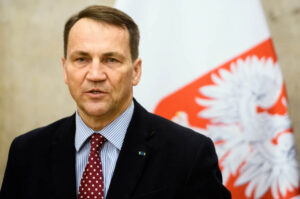
As part of its 19th package of sanctions, the European Union will impose a ban on transactions with five Russian credit institutions from November 12: Alfa Bank, MTS Bank, Absolut Bank, Zemsky Bank, and NKO Istina, according to an EU statement.
In addition, Belarusian Alfa Bank, Sberbank, VTB, Belgazprombank, BelVEB, as well as VTB’s subsidiary in Kazakhstan and VTB’s branch in Shanghai have been added to the EU sanctions list.
BAN, BANK, BELARUS, EUROPEAN UNION, RUSSIAN FEDERATION, SANCTION, TRANSACTION

The Polish Ministry of Foreign Affairs has called on the country’s citizens to leave Belarus as soon as possible and refrain from any travel there. The ministry recommends that those already in Belarus leave “by available commercial or private means,” warning that if the situation worsens, evacuation may be difficult or impossible. This was announced at a briefing on September 5 by Polish Foreign Ministry spokesman Paweł Wroński; the relevant statements were reported by the Polish media.
According to Wronski, the Foreign Ministry “strongly discourages” travel to Belarus, “which is not a democratic country and is not friendly to the Republic of Poland,” and asks that the warning be taken very seriously. Polish media outlets indicate that citizens in Belarus are advised to leave immediately.
As noted by a number of publications, the heightened warning is related to the detention in Belarus of a Polish citizen, a Catholic monk whom Minsk accuses of espionage; the Polish side called this a “provocation” and announced consular support for the detainee. Against this backdrop, the Foreign Ministry issued a separate warning about the risks and reminded citizens of the need to strictly comply with local laws.
Earlier, Polish media outlets had already drawn attention to the restrictions and risks for Poles in Belarus, including the Foreign Ministry’s recommendation to leave the country by any means available and a warning that evacuation may not be possible in the event of a crisis.

On April 24, 2025, the Government of Albania officially suspended the agreement on mutual visa waiver with the Republic of Belarus signed in February 2020. This decision cancels the partial suspension introduced in May 2024, which applied only to diplomatic passports. Now Belarusian citizens are required to obtain a visa to enter Albania.
Earlier, in May 2024, Albania partially suspended the agreement, limiting visa-free entry for holders of diplomatic and service passports. The current measure completely abolishes the visa-free regime for all categories of Belarusian citizens.
The decision takes effect immediately and is published in the official gazette of Albania.
Source: https://t.me/relocationrs/881

The European Union has expanded the sanctions list against Belarus, including seven legal entities and 25 individuals.
The corresponding decision of the Council of Europe was published in the Official Journal of the EU on Thursday.
The list of sanctioned companies includes: Integral, the managing company of Integral Holding (a major manufacturer of microelectronics), Planar (a major manufacturer of microelectronics, including military purposes), the state enterprise Plant of Precision Electromechanics (part of the State Military Industrial Committee of Belarus, according to the EU, produces, including ballistic missiles).
The list also includes SE “Belarusian Lotteries” (part of the Department of Presidential Administration of Belarus, has the exclusive right to organize lotteries), the company “Belbet” (online casino, managed by SE “Belarusian Lotteries”), LLC “Ridotto” (develops applications for online games), LLC “Tsybulka-Bel” (agricultural company, according to the EU, owned by German citizen Jorg Dornau).
The sanctions were also imposed on Sergei Avakov (CEO of Planar), Yuri Chorny (director of the Plant of Precision Electromechanics), Dmitri Shvedko (entrepreneur, majority shareholder and director of Ridotto), Mikhail Denisenko (director of the State Enterprise Belarusian Lotteries).
In addition, sanctions were imposed on the Central Election Commission of Belarus, its members, a number of judges, the manager of the presidential affairs of Belarus, Yuri Nazarov and his deputies.

The Interdepartmental Commission on International Trade (ICIT) will review anti-dumping measures against imports of cement from Russia, Belarus and Moldova to Ukraine due to their expiration.
According to a report in the Uryadovy Courier dated May 22, 2024, the anti-dumping duties previously in force by the decision of the ICIT dated May 21, 2019, are extended for the duration of the review procedure.
It is noted that the Commission considered the relevant request for review from PrJSC “Dickergoff Cement Ukraine”, PrJSC “Ivano-Frankivsk Cement” with the support of PrJSC “Kryvyi Rih Cement”, and also studied the report of the Ministry of Economy on the results of the anti-dumping procedure for the review of customs duties due to the expiration of their validity.
“The request contains sufficient evidence that the termination of anti-dumping measures against imports into Ukraine of cement originating in the Russian Federation, the Republic of Belarus and the Republic of Moldova, applied by the Commission’s decision of 21 May 2019, is likely to lead to the resumption of dumping and injury,” the ICIT said in a statement.
The Ministry of Economy has been entrusted with the review of anti-dumping measures. Stakeholders are to register within 30 days.
According to Alyona Omelchenko, Partner and Head of International Trade Practice at Ilyashev & Partners Law Firm, who represented the interests of Ukrainian cement producers, the review process may take up to one year.
“This decision of the Commission is extremely important for the work of Ukrainian enterprises. The initiation of the review of anti-dumping measures by the ICIT will extend the period of application of duties and prevent dumped imports from entering the market until the final decision is made,” Omelchenko said in a press release.
As reported, in 2019, the ICIT applied anti-dumping duties on imports of cement clinkers and Portland cement to Ukraine under codes 2523 10 and 2523 29 at the level of 57.03% for cement from Belarus; 94.46% for cement from Moldova; 114.95% for cement from Russia. The duties were set for a period of five years.